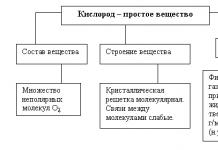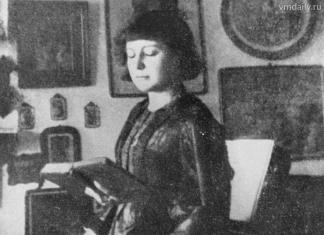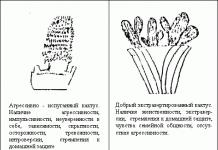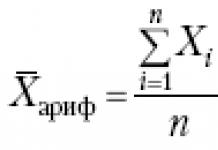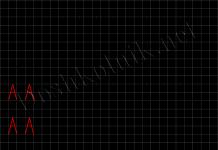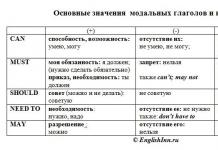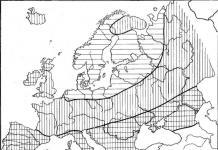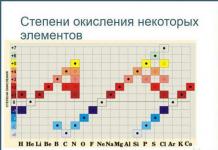The Internet was immediately followed by “denials” in regular media. With references to German diplomatic workers, Komsomolskaya Pravda hastened to declare that Putin “withdrew” his daughters from a German school back in September last year, and the cost of education in this educational institution does not exceed 500 Deutschmarks per year.[...]
Respectable establishment
“German school in Moscow named after. Gaaza” – an establishment in highest degree respectable. It is located at the address: Vernadsky Avenue 103/5, and is considered the territory of the German Embassy, that is, an inviolable German patrimony.
The school was named after the simple German doctor Friedrich Haas, who practiced in Moscow prisons and hospitals for the poor at the beginning of the last century, and through whose efforts all Russian convicts royal authorities replaced the iron foot pads with a chain. Then, for more than a century, people called them “Haas chains.” This humane act saved millions of lives during Siberian stages and transfers. When Haaz died, 200 thousand people came to his funeral in Moscow - only Khodynka and Stalin’s funeral surpassed this event in terms of mass numbers, but the burial of the German doctor took place without a bloody crush. To this day, there are always fresh flowers on the doctor’s grave. In a word, he was a saint.
“German School in Moscow” is part of a network of German educational institutions scattered throughout the capitals of many countries around the world. It enjoys a high reputation in Germany, and successful completion guarantees admission to any prestigious German university. Mostly the children of German diplomats and businessmen study here; there are also the offspring of Austrian and Swiss citizens working in Moscow. But Russian children whose parents lived and worked in Germany for a long time are also allowed entry here. The main selection criterion: the child must not only know well German, but it is also advisable to think on it. There is at the School and kindergarten, where children communicate with teachers only in German.
According to data for 1998, about 350 schoolchildren and kindergarteners studied at the School. Of these, 247 were German children, and 57 were Russian. Among them were Putin’s two daughters, Masha and Katya. Judging by the lists of students, the girls entered the School in 1997.
Of the high-ranking Russians, Putin is the only one who sent his children to this School, except for a businessman very close to Berezovsky.
It is curious that after Vladimir Putin became director of the FSB, a booth with a barrier appeared at the main entrance of the School. By the way, the 24-hour police checkpoint is still in operation today. But if when VV was the chief security officer, girls came to school only in a modest blue Mercedes with a flashing light, then when dad became prime minister, schoolgirls began to be accompanied by four jeeps with security.
Unexpected holidays
The German education system is very different from the Russian one. To begin with, German excellent students are unremitting “failing students.” “Unit” – highest score, but they put it extremely rarely.
At the School, teaching is conducted exclusively in German, the teachers are mostly German. Russian language and literature are not studied. Russian parents are forced to hire tutors so that their offspring do not completely forget how to write and communicate in native language.
German schooling, unlike ours, is more extended and lasts 13 years. Russian students of the School can receive a certificate after 11th grade and enter any Russian university with it. To enter a German higher education institution, you still need to complete your studies for another two years.
Until grade 6, children study in the so-called grandschule (primary school). 6th grade is transitional, when teachers evaluate the performance, giftedness, abilities and inclinations of each student and distribute them as follows: the most lagging behind end up in a hauptschule (general school), where the requirements and workload are minimal, the average students study according to the realschule program, and the most gifted end up to the gymnasium (gymnasium), from where there is a direct route to any German university. In Germany, students of different categories often study in different buildings and have almost no contact with each other. At the Moscow School, all three categories are collected in one class.
The subjects that children study at the School are varied. More attention, however, is paid humanities. There is even a “word of God”, naturally Catholic. But this is optional. Every week there is an ethics lesson, where children communicate with teachers on abstract moral topics.. It is given in large quantities world history: ancient Rome and Greece, the feudal Middle Ages, but not a word about Russian historical achievements.
However, the admission of Putin’s daughters to the School, apparently, had a beneficial effect on the Russification of the traditional school curriculum. The history teacher suddenly suggested that since everyone lives in Moscow, it’s probably worth learning more about the history of this ancient city and great Russia generally. Last year, I had a long discussion with my parents about whether it was worth inviting an Orthodox priest to teach the “word of God,” since there are many Russian children at the School. The issue was never resolved. But to all the traditional German holidays and weekends, the teachers unexpectedly decided to add a few more Russian ones. significant dates. Since last year, the School has decided not to hold classes on March 8 and Russian Constitution Day.
Cool prices
“German school in Moscow named after. Haaza”, of course, is paid. And since 1993, prices here have only increased. Even the Germans themselves complain about the high cost. But they understand that a good education does not come cheap, and they pay for their children without complaint.
In 1998, the fee for one child was 7200 DM per year. For the second child there was a small discount - 7056 DM per year. A total of 14256 DM (see price table). It is clear that only very wealthy new Russian parents can afford to spend such sums on their children’s education.
However, the school management is not mercantile. If a child speaks German poorly, constantly misses “A” grades, or, God forbid, gets caught with drugs, no amount of money will save him from expulsion from school.
But there is another iron rule at the School. If the parents of a gifted child provide a real certificate of their income and write an application requesting a reduction in fees, then, as an exception, they will be charged 10% of their total annual earnings for the education of one child. In this case, the approach is individual, but be that as it may, none of the teachers will spend working time on even a brilliant student for pennies under any circumstances.
It is clear that it is unlikely that even the prime minister’s salary would allow Vladimir Putin to fully pay for such an expensive education for his daughters in the German School. So BB was required to write a statement about the discount? And a significant discount, apparently, was provided to the Putin family? I would like to look at this humiliating statement by our Prime Minister, but let’s not talk about sad things.
The salary of German teachers at the School is a big commercial secret. We won't reveal it. Let us only add that the average salary of a German teacher in Germany, depending on qualifications and work experience, ranges from 8-10 thousand Deutschmarks per month. At the School, teachers' salaries are paid mainly from funds received from parents in the form of tuition fees. But some subsidies for the maintenance of the School also come from the German Ministry of Education.
So, the question is: why for the education of the daughters of the Russian and. O. the president, and earlier the director of the FSB and the prime minister, were forced to pay extra by German taxpayers? – remains open.
But this is not the biggest problem for Putin the politician.
All the best for children
Vladimir Putin’s eldest daughter Masha has indeed not been seen at the School since the end of September last year. The youngest daughter Katya studied until the Christmas holidays, which began on December 21. After the holidays, Katya did not come to school.
Now, and we know this for sure, teachers from the School regularly go to the Putins’ dacha in Barvikha. And it would be nice if these were only German language teachers, but German teachers teach Putin’s daughters geography, mathematics and other subjects in German at home school curriculum. Such home education should cost more than if the girls went to school every day. But it's safe.
There are rumors at the School that Putin's daughters will return in the spring, after the presidential elections. Everyone loves and waits for them.
In principle, there is nothing reprehensible in the fact that the daughters of such a high-ranking Russian dignitary study in a purely German School. The offspring of many government leaders from different countries study in the most expensive and prestigious educational institutions in the USA, England, and Germany, although not at the expense of their own or other taxpayers and without any discounts. In their own way, the administration of the “German School in Moscow named after. Haaz”, allowing children and children to receive expensive education almost for next to nothing. about the President of Russia - what can’t you do to increase your prestige?
I'm worried about something else. What can we expect from the future president (and for some reason everyone already doomedly agrees with this) if he teaches his children from an early age to think not in their native language, but in German, that is, he prepares them for life not in their native country, but in some other country? -something else, more civilized and prosperous? It turns out that our future president does not believe in a bright future for Russia?
The education received in German schools is considered one of the best. Therefore, it is in great demand among foreign citizens. Now in Russia it has become fashionable to send a child to study in other European countries, one of which is Germany. But, before sending your child to school in Germany, you need to have an idea about the rating of educational institutions, their structure and requirements for the educational process.
German primary schools
In Germany, the educational process at school begins at the age of 6 and lasts 4 years. The exception is schools in Berlin. It has been going on here for 6 years.
In Germany, schooling is compulsory for all children. Every year in January, an interview is held with children who will go to first grade. The degree of readiness of the child for the school educational process is determined. This interview is conducted with the help of social psychologists and doctors. If a child is not suitable for school based on several indicators, he is left for another school year in kindergarten or enrolled in a special school preparation group.
Primary school in Germany does not have a grading system for the first two years of schooling. In first and second grades classroom teacher twice a day academic year is required to draw up a detailed profile for each student. Starting from the third grade, students receive a report card twice a year, which contains all grades in subjects.

At the end of primary school, after passing testing, students receive diplomas with grades and recommendations for directions further education- these are gymnasiums (for the most successful children), secondary schools, lyceums.
German secondary education
After finishing primary school, children continue their education. Only, unlike Russian children, each child goes to his own school, determined by the testing passed and characteristics from primary school.

Education in German secondary schools takes into account personal qualities trainees and is determined in accordance with the training profile.
- Hauptschule - the training period is 5-6 years. Upon exit, the student can go to work in a low-paying job or enroll in a vocational school.
- Realschule - the period of study is 6 years and gives the student the opportunity to enter a gymnasium or find a more prestigious job. This school intended for children who have received GPA at the primary educational level.
- Gymnasium - the training period is 8-9 years. Children gain knowledge on foreign languages And natural sciences, deeply study mathematics, technology and art, preparing for admission to universities.
- Gesamtchule is something between a gymnasium and a real school, without an additional emphasis on technology and the humanities.
Grading system in German schools
When applying to a school in Germany, you definitely need to know their grading system. It differs from the Russian one in two principles:
- the level of students' knowledge is assessed on a six-point scale;
- assessments are based on the principle mirror reflection to the Russian ones.

The lowest score in German schools is 6 points. Further marks are set according to the following principle:
- Unsatisfactory - 5 points.
- Very mediocre - 4 points.
- Satisfactory - 3 points.
- Good - 2 points.
- Excellent - 1 point.
Based on the grades received over time, children are assigned to secondary schools, which are already inextricably linked with the child’s determination in big life.
Types of German schools
When sending your child to school in Germany, you need to know what types of schools exist there.

International schools are created for children of foreign citizens who wish to receive an education in accordance with the German system. To enter a school of this type, a child must have communication skills in German corresponding to level B2 according to the European assessment system.
Boarding schools are designed for children of citizens of Germany and other countries who are classified as wealthy. The level of knowledge of the German language must be higher than for international schools. Children live in residential buildings located in picturesque places in Germany, owned by this educational institution.
Russian schools provide an opportunity for Russian children to receive a decent European education. Communication in institutions takes place in two languages, with a strong emphasis on German.
Waldorf school
Parents have the opportunity to choose between a public school and a private one. The Waldorf school belongs to the private category. Germany is closely monitoring educational process in these institutions. Much attention is paid to education inner world child and his personal qualities based on individual approach. All communication is built in the spirit of brotherhood and unity.

About 20% of the children at the Waldorf school are students with a migration background. A Waldorf school provides two schools at once (primary and secondary), so getting into it “from the outside” can be quite difficult.
The best schools in Germany
When asked which schools in Germany are considered the best, media sources give the following answer:
- Boarding schools - Bon Boyel School, Acherna Gymnasium, St. Allosius College, Odenwald School. The costs of training in these schools are paid at the expense of state budget, and accommodation, meals and additional services are paid by the students' parents.
- Best private schools - Brandenburg international school, Neubeuern School, Torgelow Gymnasium, St. George's School, Salem School.
All these educational institutions are similar in the uniformity of academic disciplines. The only difference is in the range of provision of additional educational services. In addition, schools are divided by prestige. Children from wealthy families in most cases study in private educational institutions. Here are held individual sessions with those kids who are behind in some subjects.
How to enroll in school in Germany?
When entering a school in Germany, a child needs to overcome the minimum level of requirements:
- Knowledge of the German language must correspond to level B1-B2 according to European standards. English language proficiency requirements are determined by the educational institution.
- It is necessary to provide a list of annual grades received while studying in Russia over the last two years.
- Must be presented with full description per student, completed on the letterhead of the educational institution by the school administration.
Parents should come to the chosen educational institution in advance and write a corresponding application. You should take your child's birth certificate with you.
How much will you have to pay?
Well, of course, in addition to all the above requirements, parents must realistically assess the child’s desire to learn and their material well-being. The cost of studying in Germany ranges from 11,600 to 40,000 euros. Payment must be made within the first semester.
Whatever education is chosen for a child, it must be successful and worthy!
After all, Vladimir Vladimirovich is a good teacher of his own children. For at one time he sent his daughters to an excellent school (German School named after Friedrich-Joseph Haas at the German Embassy in Moscow) .
German school in Moscow named after. Gaaza is an extremely respectable establishment. It is located at the address: Vernadsky Avenue 103/5, and is considered the territory of the German Embassy.According to data for 1998 About 350 schoolchildren and kindergarteners studied at the School. Of these, 247 were German children, and 57 were Russian. Among them werePutin's two daughters - Masha and Katya . Judging by the lists of students, the girls entered the School in 1997.
The German school in Moscow is part of a network of German educational institutions scattered throughout the capitals of many countries around the world. It enjoys a high reputation in Germany, and successful completion guarantees admission to any prestigious German university. Mostly the children of German diplomats and businessmen study here; there are also the offspring of Austrian and Swiss citizens working in Moscow. But Russian children whose parents lived and worked in Germany for a long time are also allowed entry here. The main selection criterion: the child must not only know German well, but also preferably think in it. There is also a kindergarten at the School, where children communicate with teachers only in German.
Children learn freely, at their own pace according to an individual learning schedule. Increased attention to the socialization of children, developing their skills in establishing personal relationships. Only experienced, successful, positive-minded teachers work with children. Gifted children who graduate from school enter the world's best universities. We raise happy, confident people!
Description
The F.P. Haas School is a private educational institution at the German Embassy in Moscow. Educational institution recognized by the German Ministry of Education and Culture, it is officially supervised by the German Foreign Ministry. It is a member of the International Union of German Schools Abroad and has been awarded the status of “Foreign School – Excellence in Education”.
The German school was opened in 1990 and now unites children of 14 nationalities within its walls. Teaching is conducted in German, but the program is supplemented by the study of Russian, English and French. It is noteworthy that the first is a mandatory part school system and is included in the curriculum of all children from 1st to 12th grade. Despite the fact that the educational institution is intended for children of German citizens, there are many Russians among the students.

Features of studying in a German school:
- the full educational cycle includes attending kindergarten, elementary, middle and high school;
- Studies are conducted in German based on the curriculum of the state of Thuringia (Germany). Children for whom German is not their native language attend additional classes, which are organized by excluding another subject from the program, for example, their native Russian language;
- grades are given starting from the 3rd grade, at which time English lessons are introduced into the program;
- the number of students in one class does not exceed 23 people;
- after classes, children can spend time in specialized clubs; the school has an after-school program;
- To enter secondary school or Level 1, the child must receive positive characteristics teachers. The assessment of specialists largely influences the characteristics of the student’s further education;
- high school includes training in grades 5-10. The indicators of the 5th grade allow you to guide your further placement in gymnasium, basic and secondary schools. Starting from the 6th grade, the gymnasium program is supplemented by the study of the French language. In basic and real schools the emphasis is on technical disciplines, computer science, natural history;
- The German school has a sports society, a choir for adults, and a youth club.
After completing Level 2, students take an exam to obtain a high school diploma. It allows you to enter higher education educational establishments Germany, is highly valued by all Russian universities.
German school named after F. Haasa was created at the German Embassy in Moscow. It is aimed primarily at German children who, for some reason, are temporarily in the territory Russian Federation with own parents. Syllabus this school is compiled in accordance with educational standards Germany, which allows children to continue their education without any problems. However, children of other nationalities also study at the school. Along with German, English, Russian and French And. If German is not a student’s native language, he can attend additional classes in German instead of Russian language lessons. The German school has a kindergarten. IN primary school(grades 1-4) classes start at 8.00 and end at 12.35. UNTIL 17.10 children are in an extended day group. During this time they can do as they wish homework, play in the yard or in the playroom, visit the library or gym. First and second graders are not given grades. Grades 5-9 – high school. From the 6th grade, students are divided into three directions: gymnasium, real and basic school. In all three types of schools they study mathematics, German and English languages. In the gymnasium they teach French, and in the basic and secondary schools - natural history, technical disciplines and computer science. In high school there is no division into basic and additional subjects, all academic disciplines are given in the same amount.








